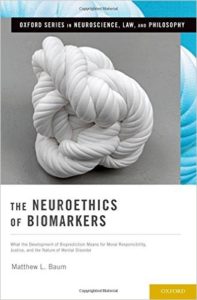
Matt Baum (a student in the lab) has written a book, published by Oxford University Press and available through Amazon, on the challenges and controversies involved in using disease biomarkers to evaluate patients, judge criminals, and make moral decisions. The book shines in its plethora of practical, thought-provoking examples and hypotheticals. In an example that highlights how our intuition of blame can shift, the reader is told of an imaginary woman who loses control of a truck and injures two pedestrians. The readers are asked how much they would blame the woman for losing control if (a) she had been driving recklessly, (b) she had an unexpected seizure, (c) she knew she had epilepsy but still decided to drive, or (d) she had biomarkers indicating she was at high risk for her first seizure but had ignored them.
In a tone that is informative and lightly humorous (particularly when the reader is forced to play Russian roulette by a mad statistician who cites a p-value for survival), Matt illustrates how the binary nature of the courtroom (guilty vs. innocent), hospital (sick vs. healthy), and morality itself (good vs. bad) often clashes with the continuous, risk-based nature of biomarkers. However, he provides hope for resolution by citing areas that already deal in shades of gray, such as using cholesterol levels to predict heart disease and sentencing criminals in accordance with the magnitude of their particular crime. He also proposes novel solutions such as shifting the binary diagnosis of disease to more of a continuous risk vs. time model.
The book is based on Matt’s DPhil work at Oxford. About the book deal, Matt says it started with an email to an editor at Oxford University Press who was working on a book series covering the intersection of neuroscience, law, and philosophy. She loved the idea, and sent his book proposal out for review. After years of working on this project, Matt says he’s happy to have the book finally off his computer and into the world.
By Christina Usher